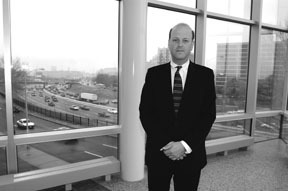Name: Dean M. Esserman
Position: Providence Police Chief
Background: Served as general counsel and advisor to Chief William Bratton of the New York City Transit Police; assistant chief of police in New
Haven, Conn.; chief of police for the M.T.A. Metro North Police Department in New York City; chief of police in Stanford, Conn.; and, most recently, executive managing director of Thacher Associates LLC.
Education: Bachelor’s degree from Dartmouth College and a jurist doctor from New York University School of Law. He was also a fellow at the Yale University
Child Study Center. Esserman is a graduate of the New Haven Police Academy.
Age: 45
Residence: Providence
PBN: You have received high marks early on in your new position. What have been the keys to your early success in terms of improving morale?
ESSERMAN: I have two answers for you. The first answer, I like cops.
I don’t see how you can lead them if you don’t care about them. And I believe in showing them respect; they deserve it. I’m not sure that they have been shown respect in the past. The second answer is what Napoleon said when he was asked who makes your best generals – the lucky ones. So maybe I’ve had some luck.
How do you go about making improvements during cash-strapped times?
It’s the same answer. You believe in your people. The people are more important than this pretty building. I don’t think they have been treated well. I think they rise to the challenge, and rarely will they disappoint. We have some remarkable people who have been treated remarkably poorly.
Because this mistreatment went on so long, do you think people can forget
how it could be?
I could see how you can grow cynical. I walk into this new building and department as a new guy, I trust them and respect them. I know it will take a little while to earn their respect, and that’s the way it is supposed to be.
Are you pleased with the start you have made so far? You must judge your
performance regularly?
Yes, I do that a lot. I think we are moving forward.
Describe your management style?
I like to work, I like to work a lot. I enjoy the company I keep – I like being around police officers. I like to manage by walking around. I try to find my cops, I try to catch them. The difference is that I try to catch them doing something right, not something wrong.
Where did you learn that?
Bill Bratton (former chief of New York City Police, who Esserman worked for, and current police chief of Los Angeles) and Lee P. Brown (Houston mayor and former police commissioner in New York City).
How much of your time is working on budgets and administrative duties?
Too much. I was hired to lead this police department, not to manage it. I surround myself with the managers I need. My first and foremost responsibility is to be a leader. You don’t lead people from the office. You lead them by getting out there with them and focusing on the core competencies of the agency and seeing where the crisis is. This is an effort in reengineering. What is remarkable is it is the men and women of the department who we have asked to reengineer this place – not consultants. The talent is here, but people just have not been asked to help.
I try to spend the majority of my time in the community or with the rank and file of the department. I’ve got to hear what they’ve got to say.
How are you getting to know the neighborhoods of the city?
I usually get up at 5:30 in the morning and go running. Then I get dressed and try to have breakfast in different neighborhoods of the city and walk around and get to know them. At night, I get out on patrol and get to know the neighborhood that way too.
Where was your last breakfast visit? What did you learn from the visit?
I had it on Wayland Square this morning. I’m learning that this is a city of many neighborhoods, which is why I’m convinced that a neighborhood-based approach to policing is exactly the direction we should go.
If community policing seems to be the answer, why has it taken so long
to get to it? Why is it such a big deal to get it going?
I don’t know, because it hasn’t been in other cities. I think the mayor’s vision is just right, that we need to bring community policing to this city. There is a love affair that has been waiting to happen between the people of this city and its police force, if we just let it happen. Yeah, we have a pretty building here, but it doesn’t matter because people live and work in neighborhoods. You know what, they’re not supposed to come to us. That’s why we are decentralizing the department into the neighborhoods. I think our community policing effort here will be called a neighborhood-based approach. I think the mayor’s vision is just right and our job is to make his vision a reality.
Mayor Rudy Giuliani got off to a great start in New York because he really
attacked crime. Do you see that as being important to Mayor Cicilline?
Yes, I think that it’s not just bringing crime down, it’s bringing fear down. People need to have a sense of comfort and well-being in their neighborhood, in parks, walking downtown. It’s essential. It’s the bedrock to economic development for this city. Police need to be seen as part of the solution, not apart from it. We need to be engaged with everyone, including business groups, and we need to be partners. We are not always great at being partners. We’re like the 600-pound bear that chooses who to dance with and choose when to stop. It is going to take us awhile to learn how to be a good partner.
Let’s talk about downtown. Many people think it is unsafe downtown. Is
that perception or reality?
I think it is very safe downtown. It’s more of a perception issue. I used to see people walking downtown all of the time, but I never saw police officers walking downtown. I think people enjoy seeing police officers walking downtown. It gives them a level of comfort.
What about the college students downtown. Is that a manageable population?
We can manage anything. We are blessed to have so many colleges and universities in this city. As far as the question of the clubs at night, we will be doing that differently. We have started to bring in the club owners. We are meeting with them, and not to beat them up, but to work together. It’s the first time they have been invited to police headquarters as a group. We have to work together. We don’t want to make the mistake that New Haven (Conn.) did, with clubs and bars that were out of control. We want people to come to the city, but to have a safe and comfortable time. We want to respect the fact that downtown has become like it has in cities all around this country, which is mixed-use. It’s about business, entertainment and residential, and we have to figure out how to live together. We can’t let one group drown out another.
What should businesses be engaged in to improve downtown? I know there
is talk of a business improvement district.
I have done a lot of work with business improvement districts, as I’m sure you know. I worked with the Grand Central Partnership, I worked with the one in Stamford and I worked with the one in New Haven. It makes a tremendous difference. I think that police are only part of the solution. At any time in this city – any city in this country – there are more private security on duty at any time of day than there are police. In this city we are blessed with university police forces, private security … we have so many resources here. We need to find a way to coordinate them, because people are comfortable when they see the uniform, no matter what uniform. Secondly, we should be able to share information better. The third point is that we should be putting our heads together with business people to think about what type of environmental changes make a difference. It’s called “street-scaping,” whether it’s signage, whether it’s what cleaning efforts we are making, how we are redesigning sidewalks, benches, garbage pales. All of those things can really make a difference, and the police should be part of that conversation.
A lot of focus is on some of the troubled areas, or the perceived troubled
areas, but how do you go about reaching all the neighborhoods of Providence?
Every neighborhood really has issues. I think a mistake police make sometimes is to say that ‘hey, I know you have problems, but you should hear about the problems over there.’ That doesn’t work. Every community has issues, and every community should have police services dedicated to that in their neighborhood. If one neighborhood’s issues are car break-ins and speeding cars on Blackstone Boulevard then that should be a police department problem for that neighborhood. The residents should not hear ‘well we wish we could tend to it, but we’re having another issue somewhere else in the city.’ If you spend your time listening to people instead of telling them your opinion you will find that quality of life issues really make a difference and need to be paid attention to.
What are some of the top categories of crime facing the city that need
to be addressed?
First and foremost every police chief in America has been forced to think about terrorism today. … The country’s 235 city police chiefs are very worried about terrorism. We recently met in Washington to talk about that. That is an issue that we have to be concerned about and I think we are doing a better job than before. Also, we have to be conscious of the fact that people can be abused and be the target of hate crime. We have to be sensitive of that, especially during these times. We have to realize the declining crime of the ’90s has changed, and in most cities in the country crime is going up again. There are probably a variety of reasons, like the economy is turning. In 2001, 600,000 people returned from prison to society … it’s the first time in our history that more returned than went. We have been building prisons like crazy for 20 years.
Is there any reason why this department cannot be the best department in
the nation?
We will be the best police department because the people I have encountered
here are up to it. I love to quote Muhammad Ali. The best poem, I think, is
his shortest. He stood up at Harvard and he said just two words: me, we. This
will be the best police department in America not because of me, but because
of we. We have some great people here.
For the complete current issue, visit our subscription Web site, or call (401) 273-2201, ext. 227 or 234.













